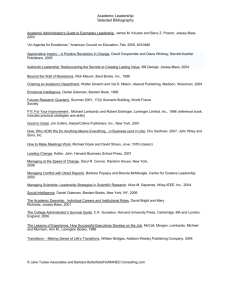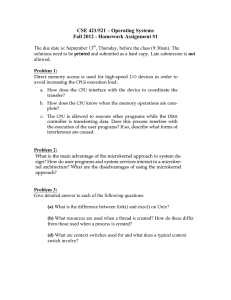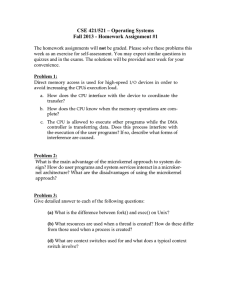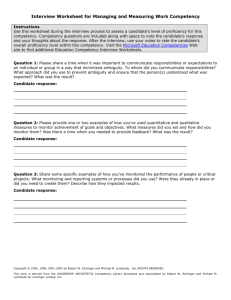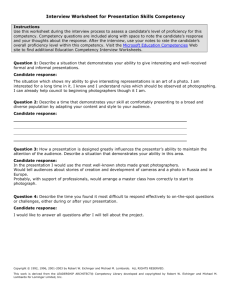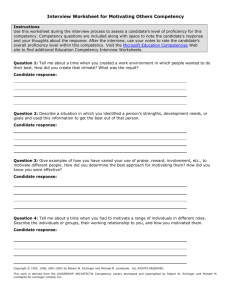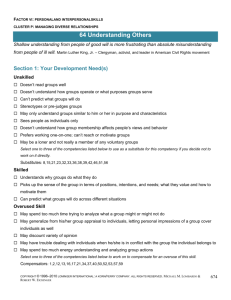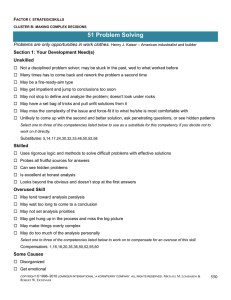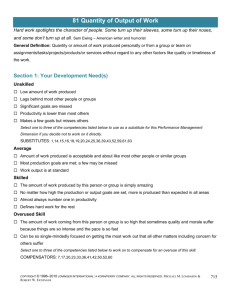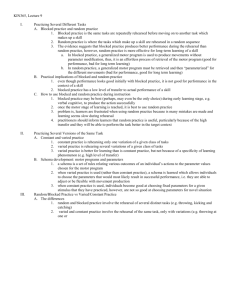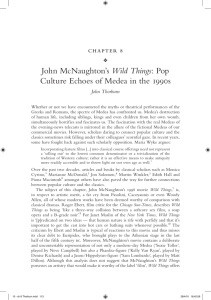Pursue Lifelong Learning
advertisement
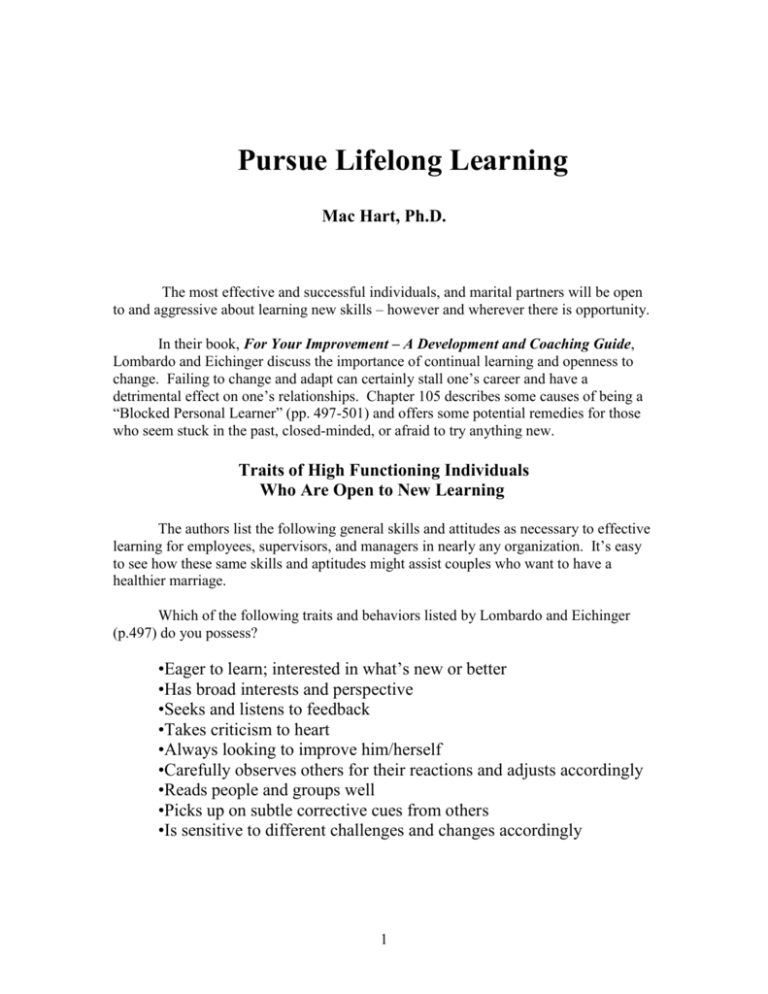
Pursue Lifelong Learning Mac Hart, Ph.D. The most effective and successful individuals, and marital partners will be open to and aggressive about learning new skills – however and wherever there is opportunity. In their book, For Your Improvement – A Development and Coaching Guide, Lombardo and Eichinger discuss the importance of continual learning and openness to change. Failing to change and adapt can certainly stall one’s career and have a detrimental effect on one’s relationships. Chapter 105 describes some causes of being a “Blocked Personal Learner” (pp. 497-501) and offers some potential remedies for those who seem stuck in the past, closed-minded, or afraid to try anything new. Traits of High Functioning Individuals Who Are Open to New Learning The authors list the following general skills and attitudes as necessary to effective learning for employees, supervisors, and managers in nearly any organization. It’s easy to see how these same skills and aptitudes might assist couples who want to have a healthier marriage. Which of the following traits and behaviors listed by Lombardo and Eichinger (p.497) do you possess? •Eager to learn; interested in what’s new or better •Has broad interests and perspective •Seeks and listens to feedback •Takes criticism to heart •Always looking to improve him/herself •Carefully observes others for their reactions and adjusts accordingly •Reads people and groups well •Picks up on subtle corrective cues from others •Is sensitive to different challenges and changes accordingly 1 Some of Us May Be “Blocked Personal Learners” This phrase, “blocked personal learner”, is Lombardo and Eichinger’s moniker for individuals who are closed to new learning about themselves, other people, management and leadership skills, and more helpful approaches to getting the job done. We all know this type of person. They can be doctors, lawyers, Indian Chiefs, or yes – husbands and wives. They are often described as “stuck in the past”, “afraid to try anything new”, and “needing proof that the new way is better before giving it a chance”. Many years ago, I knew a police sergeant who might have been the poster child for “blocked personal learners”. He was a very traditional man, a perfectionist of sorts, who clung to the old ways – the “tried and true”- so vigorously and fearfully that change of any sort was out of the question. He rejected new ideas outright and regularly squashed suggestions from his direct reports and fellow supervisors. He was a perfectionist, very narrow in his scope of interests, and took as few risks as possible. He was clearly too comfortable with himself and his restricted worldview. Sadly, he also blocked change for others around him. His career advanced no further. So, he rode out his remaining years and retired quietly without much fanfare. Police department managers, and surely those who worked under him, were pleased and relieved to see him go. Possible Remedies When Personal Learning is Blocked Note: The following ideas and suggestions are drawn from Lombardo and Eichinger’s book, For Your Improvement – A Development and Coaching Guide (Lominger Limited, Inc., 2000). 1. LOOK FOR WAYS TO GET OUT OF YOUR COMFORT ZONE So instead of relying upon tried and true solutions, and moving quickly towards a conclusion about what is needed – slow it down, and ask yourself a series of questions that might expand your awareness and perspective. Some helpful questions might include: “What kinds of thing could be causing this situation or problem?” Try to list as many as possible using a “brainstorm” format. “What connections or inter-relationships do I see within the problem field?” Take time to search for patterns in the data. “What might I be missing here, and failing to take into account?” Then, allow some time to pass while you mull over the possibilities. This will help you to avoid rushing to a “solution” that may or may not represent the best course of action. 2 2. OBSERVE HOW OTHERS ARE REACTING TO YOU It is imperative that you observe, monitor, and track the reactions of other people as you are speaking with them! If you don’t, you will miss critical feedback and be unable to make necessary adjustments. So, check in with your audience (spouse, friend, coworker, supervisor, direct reports) frequently and change tactics when necessary. Lombardo and Eichinger illustrate this feedback loop with one’s audience as follows: “Are they bored? Change the pace. Are they confused? State it in a different way. Are they angry? Stop and ask what the problem is. Are they too quiet? Stop and get them involved in what you are doing. Are they fidgeting, scribbling on their pads or staring out the window? They may not be interested in what you are doing. Move to the end of your presentation or task, end it, and exit” (p499). 3. PERSEVERE IN EXPRESSING A DESIRE TO BE MORE OPEN Like it or not, people may have a very hard time believing that you are sincerely wanting to be more open and responsive to them, when for so long you have been viewed as not open to learning or ideas different from your own. So be prepared to “signal repeatedly” that you are open to others by: asking for their input, showing interest in what they have to say, listening closely to their personal feelings and concerns, and maybe even thanking them for their unique viewpoints. Lombardo and Eichinger warn us that our initial efforts may get rejected, so it’s important to persevere. “It would be a rare group of people who would respond to your new overtures without making you squirm a bit because they have seen you as closed up to this point” (p.499). 4. EXPERIMENT WITH NEW TECHNIQUES It’s time to shake it up a little bit. Break away from quickly driving towards some conclusion. The authors suggest mimicking the things that excellent personal learners do: ask lots of questions, speak briefly, review and summarize what you’re hearing and expressing during the conversation, and when expressing a strong point of view – always make room for the other person by asking what they think as well. 3 5. BE A PIONEER OF SOMETHING NEW Others have you pegged as someone who never changes, who is stuck in the past and has no interest in exploring anything new. This is your big chance. Secretly, unbeknownst to anyone else, the authors suggest that you “find some new thing” and become expert with it. This could be a new piece of police software, a piece of equipment for street patrol, a cutting-edge technique of strategy for problem solving. It almost doesn’t matter what it is, but devote yourself learning everything you can about it – then introduce it to the people you work with as something they may want to consider adopting. They may not fall out of their chairs but you will have gotten their attention in an unexpected way. 6. SELECT THREE TASKS YOU’VE NEVER DONE BEFORE AND DO THEM. CONSIDER VOLUNTEERING FOR A TASKFORCE. This is probably fairly self-exploratory. At the job, most people have some standard assignments and tasks that they do on a regular basis – things that may not require a lot of thinking or stretching to accomplish. We get comfortable doing “our thing”, whatever that thing is and can begin to see the world through some pretty narrow lenses. 7. SEEK NEW EXPERIENCES IN YOUR PERSONAL LIFE Finally, stop doing the same old stuff in your private life! Move beyond your routines and deadly predictability. Do you constantly eat at the same restaurants? Take the same kinds of vacations? Go to the same events year after year? Break out! Make a conscious decision to expand yourself – try to make your life more of a personal learning adventure. If you have been a “blocked personal learner”, as described above, your family and all those around you will really appreciate your efforts to open up to the larger world of people, places, and ideas. So, regardless of who you are take a good look at yourself and decide if you are energized and open about new learning, or blocked in some way. If you need input from others to effectively answer this question, be sincere in asking your friends and coworkers for some honest feedback regarding your “openness to new learning”. Then, 4 give them a couple days to think about your question before getting back to you. 5
